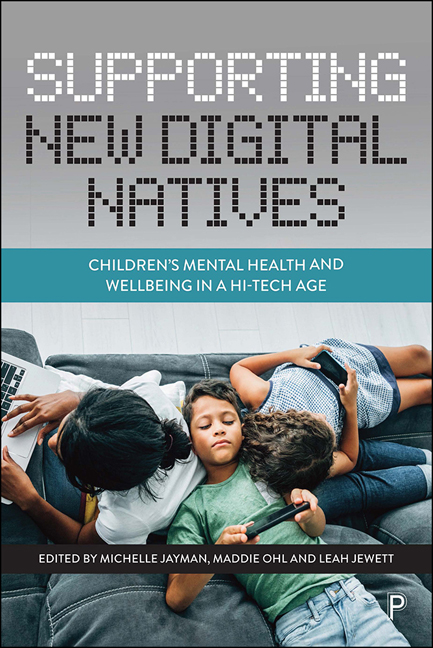Book contents
- Frontmatter
- Dedication
- Contents
- List of figures and tables
- Glossary
- Notes on contributors
- Foreword
- Preface
- 1 Digital lives: growing up in a hi-tech world and staying mentally healthy
- 2 Pyramid Club: building skills for healthy friendships and relationships in a digital age
- 3 Supporting children’s healthy socio-emotional development through play: Book of Beasties – the mental wellness card game
- 4 The School Counselling Partnership: providing support and promoting self-care for school communities
- 5 The Breeze Project: supporting children and young people through Forest School
- 6 Promoting the mental health of girls and young women in the community: the role of Girlguiding
- 7 Supporting families to navigate the changing sex-education landscape: Outspoken Sex Ed
- 8 The Lift Off programme by Red Balloon: online learning and wellbeing support for children who self-exclude from school
- 9 The LifeMosaic project: supporting wellbeing and empowering pupils through design, development and research
- 10 Building better mental wellbeing for children: rebel thinking and innovative practice
- Index
2 - Pyramid Club: building skills for healthy friendships and relationships in a digital age
Published online by Cambridge University Press: 13 May 2022
- Frontmatter
- Dedication
- Contents
- List of figures and tables
- Glossary
- Notes on contributors
- Foreword
- Preface
- 1 Digital lives: growing up in a hi-tech world and staying mentally healthy
- 2 Pyramid Club: building skills for healthy friendships and relationships in a digital age
- 3 Supporting children’s healthy socio-emotional development through play: Book of Beasties – the mental wellness card game
- 4 The School Counselling Partnership: providing support and promoting self-care for school communities
- 5 The Breeze Project: supporting children and young people through Forest School
- 6 Promoting the mental health of girls and young women in the community: the role of Girlguiding
- 7 Supporting families to navigate the changing sex-education landscape: Outspoken Sex Ed
- 8 The Lift Off programme by Red Balloon: online learning and wellbeing support for children who self-exclude from school
- 9 The LifeMosaic project: supporting wellbeing and empowering pupils through design, development and research
- 10 Building better mental wellbeing for children: rebel thinking and innovative practice
- Index
Summary
The importance of developing emotional competence and friendship skills in school-aged children cannot be underestimated (Rubin, Bukowski and Parker, 2006). Friendships experienced in childhood provide us with a blueprint for relationships in adult life (Monsour, 2008). Not only do they offer support in coping with stresses encountered at home or in school, they also protect against the adverse effects of negative peer relations such as bullying (Cardoos and Hinshaw, 2011). Importantly, good-quality friendships can improve children's attitudes towards and engagement with school (Perdue, Manzeske and Estell, 2009). In the highly digital world which many children inhabit, the internet and social networking sites have opened up new avenues to make and maintain friendships both off- and online (Gluer and Lohaus, 2016). This development can be seen as both a force for good – enabling children to discover novel ways of establishing new friendships and communicating with existing friends – and a force for bad, as abuse of such technologies can lead to new and pervasive forms of social exclusion and bullying (Frith, 2017).
In particular, for those children who internalise their difficulties and tend to be quiet, anxious and withdrawn, securing a supportive peer group can prove challenging – and these children are more likely to be at risk of abuse and bullying (Ohl, 2009). They may struggle to initiate peer interaction and as a result are more vulnerable to peer rejection and social anxiety. Furthermore, recent research in the Netherlands suggests that children with social anxiety are more prone to perceive that they are less likeable by their peers and to anticipate rejection even when this may not be the case (Baartmans et al, 2020), setting in train a self-perpetuating cycle of increased anxiety and low self-esteem. Socially anxious children are also more vulnerable to their anxiety persisting during adolescence and adulthood (Keller et al, 1992), often resulting in poorer future outcomes both educationally and personally (Fluori, Buchanan and Bream, 2000). Therefore, it is essential that all children are given the support they need during their childhood and adolescence to gain the socio-emotional skills required to build and sustain healthy friendships in school and outside, and for a generation of new digital natives (NDNs), both off- and online.
- Type
- Chapter
- Information
- Supporting New Digital NativesChildren's Mental Health and Wellbeing in a Hi-Tech Age, pp. 23 - 40Publisher: Bristol University PressPrint publication year: 2021

